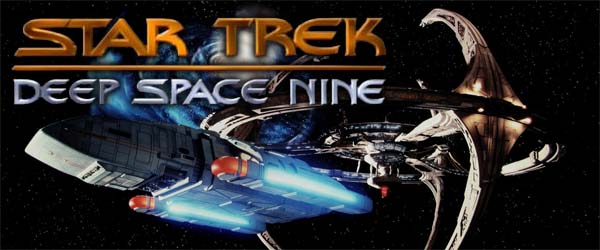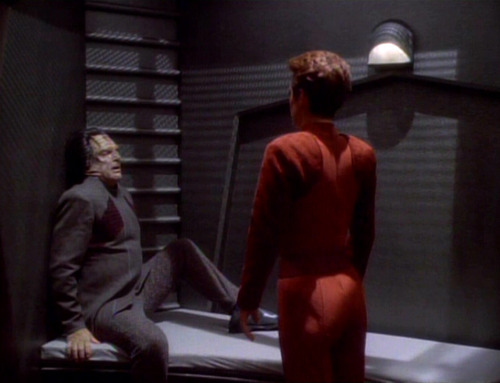
The Next Generation, Deep Space Nine, and (depending on who you talk to) Voyager are widely regarded as the "Golden Age" of Star Trek. Since many Trekkies look back at this time period of the late 80's and 90's with the rose-tinted glasses of nostalgia, it might surprise you to read that Deep Space Nine used to be a highly divisive topic among Star Trek fans. Even to this day, I've talked to "hardcore" Trek purists who dislike Deep Space Nine because of how dark and conflict-driven the series is. I can't imagine what these people must think of the Kelvin-verse reboots, Star Trek: Discovery, or Picard. If you think I'm hard on those recent iterations of Star Trek, then you should talk to these people!
In any case, the idea that DS9 is too dark and conflict-driven is a valid criticism from someone coming from the perspective of a fan of The Original Series and Next Generation. Both of those shows were about an idealistic future in which humanity had grown out of its petty squabbles and now seeks to better itself through cooperative exploration and colonization of space. Deep Space Nine didn't quite accept those ideas at face-value. Deep Space Nine's more pragmatic approach had some fans believing that Deep Space Nine violated the spirit of Star Trek.
Many fans of The Original Series and Next Generation criticized Deep Space 9 for being "too dark".
Deep Space Nine was also the first Trek series to be highly serialized, having a singular, overarching plot throughout most of the series, and with frequent mini-arcs running for half a season or a whole season. TNG had its share of recurrent story arcs. Q's "trial of humanity" was pitched as a framing mechanism for the entire show, but ended up only serving to bookend the series, while relegating most of Q's appearances each season as comic tangents. There were other recurrent sub-plots as well, such as Worf's discommendation from the Klingon Empire and his conflict with the Duras House in the "Sins of the Father" arc, the Borg story thread, Data's relationship with his brother Lore, Wesley's training as a Starfleet officer, and a few others. But TNG stayed mostly episodic. Almost all the single episodes of TNG (and the two-parters as a whole) can be enjoyed independently, without having seen any previous episodes of TNG. That was not the case with DS9.
I missed many episodes of DS9 because
it aired on weekend evenings.
DS9 was on the air throughout my elementary school and middle school years (I was seven when the show premiered). It frequently aired (syndicated on Fox in my region) on weekend evenings, and I was often outside playing tag, riding bikes, or playing touch football or street basketball with neighbor kids. As such, I missed a lot of episodes. Due to the highly-serialized nature of the show, when I would see an episode, I would have no idea what was going on! Because I rarely watched the show, and didn't understand it when I did see it, I didn't particularly like it. I'd still watch it, because it was still Star Trek. In fact, Voyager was the first Star Trek series that I watched regularly (it being on Wednesday nights, when I wasn't outside playing), and, well, you all know how I feel about Voyager.
In fact, I grew up with a bit of a preconceived notion that Deep Space Nine was the "bad" Star Trek series -- even though critics at the time largely appreciated it. On the off chance that I could talk about Star Trek with a peer, they generally didn't like DS9 either -- for many of the same reasons.
It wasn't until my college years, when the show was released for sale on DVD that I sat down and watched the whole series from start to finish. At first, I wasn't even sure if I wanted to bother buying the DVDs. After all, DS9 was "the bad Star Trek". So why spend the money? And those DVDs cost a lot of money! CBS wanted something like $120 for a single season, compared to $30 or $40 a season for shows like E.R. or Grey's Anatomy. At least the Next Gen DVDs came in fancy, sturdy boxes. The DS9 DVDs came in cheap, flimsy, rigid plastic booklets that start to fall apart as soon as you open them. I think my mom bought them from Costco for $90 a pop -- a considerable discount, but still obnoxiously expensive!
CBS wanted $120 per season for DS9 DVDs!
I was now older. I was coming to terms with my personal identity as a progressive secular humanist. Most importantly, I could finally follow along with the various multi-episode story threads and the complex, nuanced characterizations. And boy, did my opinions on the series change!
I'll always have a soft spot for Next Generation. That show has my favorite Trek character: Data. And Picard is probably my third favorite character after Spock. After my single favorite episode of Trek, the Original Series' "Balance of Terror", most of my runner-up favorite episodes are TNG episodes. Episodes like "The Measure of a Man", "Who Watches the Watchers", "The Offspring", "The Best of Both Worlds", "Deja Q", "I, Borg", "Tapestry", "The Inner Light", "Darmok", "All Good Things...", and so on...
Despite my fondness for Next Generation, I actually think that Deep Space Nine is the better all-around show.
Every Trek series since the original has taken a couple years to really find its footing. TNG doesn't really figure itself out until midway through season 2, and Voyager takes until the 4th season to figure itself out -- if ever. I don't know if Discovery ever righted its ship, since I didn't bother to watch past the first season, and Picard didn't even become watchable until the third season. I feel like DS9 finds its footing much earlier than TNG or Voyager. Deep Space Nine's characters, themes, and stories start to fall in place by the end of season 1. In fact, one of my favorite episodes of the entire series (and one of my favorite episodes of Trek in general) is a season 1 episode: "Duet". DS9 is the only Trek series (since the original) for which one of my favorite episodes comes as early as the first season.
 - DS9 "Duet", season 1, episode 19
- DS9 "Duet", season 1, episode 19
One of my favorite DS9 episodes (and Trek episodes in general) is the season 1 Holocaust allegory, "Duet".
The last episode of season 1, "In the Hands of the Prophets" starts to set up the season-long arcs (and a series-long arc) that would become a trademark of the series. That episode introduces us to recurring villain Vedek Winn and starts the process of her gradual accumulation of power, which we'll talk about later.
But despite the series coming together better in the first season, critics of Deep Space Nine aren't wrong when they say that it "feels different" from the Original Series or Next Generation. The show is unarguably darker and more conflict-driven. The entire second half of the series is about an interstellar war, and the seasons leading up to that repeatedly tell stories about domestic terrorism, Holocaust allegories, religious persecution, and cynical politics. These sorts of themes were present in episodes of TOS and TNG here and there, but DS9, at a fundamental level, was about these difficult topics.
[More]